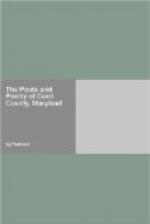Mr. Duke remained in Cecil county until 1812, when he took charge of Charlotte Hall, in St. Mary’s county, and continued in charge of the school at that place until 1814, when he returned to Elkton, where he officiated as aforetime until the Spring of 1818, when he was appointed Principal of the Academy. He continued to reside in Elkton until the time of his death.
In 1793 Mr. Duke married Hetty Coudon, the daughter of the Rev. Joseph Coudon, a former Rector of North Elk Parish, and the ancestor of the Coudon family of this county. Mr. and Mrs. Duke were the parents of Miss Hetty Duke, who was their only child, and who died in Elkton, February 19th, 1875.
Mr. Duke was a very learned man, and is said by the Rev. Ethan Allan, the Historian of “The Old Parishes of Maryland,” to have been more of the student than the preacher. He was the author of a pamphlet published in Elkton in 1795, entitled “Observations on the Present State of Religion in Maryland,” which is now of great rarity and value. He also published a small volume entitled “Hymns and Poems on Various Occasions,” which was printed by Samuel and John Adams, of Baltimore, in 1790; and several other poems of considerable length, the most popular of which was entitled “A View of the Woods,” which was descriptive of the adventures and experience of Western emigrants in the latter part of the last century.
The following selections have been made from “Hymns and Poems on Various Occasions.”
HYMN.
And truly if they had been
mindful of that country from whence they
came out, they might have
had opportunity to have returned; but now
they desire a better country,
that is, an heavenly.
—Hebrews 11:15,16.
Abr’am, the father of the Jews,
The servant, and the friend of God,
When call’d from heaven, did not refuse
To leave his Syrian abode.
His father’s house and kindred dear
Plead, and dissuaded him in vain;
Neither could earthly hope nor fear
The noble enterprise restrain.
Nor he alone; a host of saints
Renounced the world, and nobly chose
That heavenly inheritance
Which neither death nor sorrow knows.
No intervening dangers check
Their ardent progress to the skies,
Well may they venture, who expect
An heavenly and immortal prize.
When faith to their delighted view
Their future blissful portion brings,
They, firm and cheerful, bid adieu
To sin, and self, and earthly things.
Happy to leave the world behind,
Their conduct speaks a noble aim;
They seek a city, and shall find
The promised new Jerusalem.
Nor yet does impotence or fear
Their sense of earthly bliss restrain,
Did they not heaven to earth prefer,
They soon might wed the world again.
In heaven their treasure is laid up
Beyond the reach of accident,
There shall their lively glorious hope
Receive its full accomplishment.




